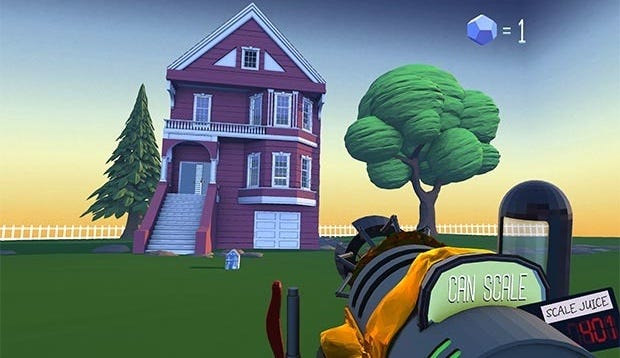Interview: Steve Swink On The Scale Of SCALE
Big Ambition
Steve Swink is a man of damned good ideas. Thankfully, he also makes them into games. And from what I've played of an early build of SCALE, his latest is something pretty special. First winning crowds over at GDC this year, it's now in the very final days of a Kickstarter, topping its target late last night. We caught up with Steve to learn how the idea began, before growing and growing into a full-sized videogame.
RPS: What tends to be your approach to a new game? Is it concept before how it plays, or a concept invented to allow a certain type of play?
Steve Swink: I have a sagging notebook full of ideas for games or game-like things. The main difficulty is sorting them by priority. I have to be realistic: I won’t be able to make all these games. So I apply some criteria. Is the idea…
1. Interesting to me personally. Making games is still super hard and time consuming, even with modern tools. People like Cactus blow my socks off with their ability to sketch in game form. That’s why his stuff always feels so fresh and vibrant. Buuuut I’m not Cactus. I have to mull and dither and keep fleshing out my ideas with sketches and prototypes before I’m willing to commit to seriously trying to make them, let alone push them into the public spotlight.
2. Something that advances the medium in some way. There’s a lot of overlap between 1 and 2 for me. I just can’t seem to get enthusiastic about a game concept unless it’s kinda out on the frontier. Except roguelikes with twitch controls. I really want to make a true-to-the-genre western roguelike. And I have prototypes for a space mining roguelike and a realtime X-COM homage roguelike in first person.
3. Something that may eventually pay the bills. Money! Argh, it’s so annoying. But this has to be one of the criteria if you want to keep making games autonomously. So, if people seem to get really excited by seeing a prototype of an idea, I have to take that into account.
4. Can it actually be done? And can it be done in a reasonable amount of time? I seem to have a regrettable instinct for ideas that get peole really excited but which are extreme technical challenges (see: Shadow Physics.) The first SCALE prototype was done at a game jam in two days. But my concern was: can I actually make this robust enough to build an entire game out of? Physics engines aren’t built to handle dynamically scaling objects, for example. What made it work was the help of my friend Eddy Boxerman, who made the game Osmos. He is a crazy physics PHD ninja and with his help we have most of the core SCALE gameplay issues solved.
RPS: For SCALE, it's one of those cases where you see it, and it's both breathtaking, and yet somehow seems like it should have been an idea someone came up with years ago. Can you talk a bit about how you came upon the idea, and then developed it?
Steve Swink: I started really poking at the idea five years ago or so. I was sitting in Jon’s [Blow] excellent Design Reboot talk at MIGS (before Braid came out!) and pondering ideas for games that deeply explore mechanics. It seemed like an obvious idea to me - scaling things up and down is easy and interesting in 3D programs like Maya - but then so do things like Braid or FTL in hindsight. It’s not as though people hadn’t used rewind mechanics in games before, or tried to make a Starship Captain Bridge Simulator before. It’s all about coming at the idea from a different angle. Thinking laterallly, and trying to let the design breathe. Asking over and over: where does this want to go? What’s acutally interesting about this? What happens if there’s no constraint on how much you can scale things? What does the gameplay become then?
RPS: SCALE instantly won over the crowd at GDC earlier this year. While a reaction like that must be very encouraging, can it make the process of seeing the game work out become more daunting?
Steve Swink: It can. Especially with my experience on Shadow Physics. I think that people’s overwhelming postiive response to Shadow Physics provided far too much of the impetus to develop it into a complete game. Lesson learned. Before I showed SCALE publicly I knew it was a fun game for humans to play. Shadow Physics never was; it was always just a concept that excited people.
RPS: Why Kickstarter? What is it about this game that has seen your ambition increase so much?
Steve Swink: Well I’ve been working on it for about a year now, just burning savings. At this point I simply need funding to keep the lights on or I’ll need to go do contract work, which is time consuming, stressful, and distracts from working on the game. The scope of SCALE has been set since before I started working on it full time. More than any other game I’ve worked on, really, except perhaps for Tony Hawk Underground. I knew I would need funding before it could be finished. Kickstarter seemed like a good way both to get funding and to do a dry run of sorts for marketing the game.
What I’ve learned thusfar about marketing SCALE is: more heart. People are drawn in by the unexpected implications of being able to freely scale stuff in a 3D world. But they need more of the story to feel satisfied emotionally. As with Portal, people came for the mechanic but stayed for GLaDOS. They said that no matter what they did, if the game was purely puzzles, people would fatigue and stop playing at the one hour mark. This is why at around the one hour mark you really start to view GLaDOS as an adversary, and make your escape. We have this wonderful story written by Dale Beran as well as two amazing voice actresses in Ash and Sarah; we need to get that to the forefront for people when they see the game.
RPS: Can you talk a bit about the team? How did you all come together?
Steve Swink: The team is a bunch of good friends of mine who were stoked about the concept. That’s it, really. Everyone works really well together and it’s wonderful to work with such talented people. [You can see the full list of the very impressive team on the KS page.]
RPS: What's important to you about games? I'd argue you're something of a deconstructionalist, wanting to pull at threads, as well as a constructionalist, wanting to build them in new ways. Why games, and what motivates your development?
Steve Swink: All I ever wanted to do is make games. I used to play Commodore 64 with my dad when I was 6 or 7. He taught me some basic programming stuff. I was obsessed with this game Sea Route To India. It was something like Oregon Trail but about navigating the horn of Africa in the 1700s to find a direct path to the lucrative trading ports of India. After that I just wanted to make games. I played SimAnt and I thought I had a clear idea of the thinking behind it, about how that game was constructed. So I went to the library and got a stack of books on bees and some hexagonal graph paper and did a design doc for SimBee. I told Will Wright that when I met him. He thought it was pretty funny.
As for deconstructing - I think I did a lot of that with my book. I tend to think much more in gestalt now. It was a worthwhile exercise and I hope it helps some people, but I think that the only way to true game design knowledge is to make games. You have to struggle with design problems to get better. 10,000 hours and all that. Sometimes you struggle with things that seem simple. You make a lot of crappy things. Eventually you start to foresee certain problems and anticipate their solutions. One day you realize you’re getting bored with simple things, with trodden ground. Then you start thinking about novel problems. I would say I’m just now starting to be able to execute on my ambitious designs. Of course, whenever I feel like that I have to remember how many times I’ve felt like that in the past. Time to reassess and remember the domain of my ignorance.
RPS: Thank you for your time.
SCALE's Kickstarter still has two days on the clock, to see how much it can exceed its goal. $15 picks up a copy, aiming to be out by Christmas next year. Steve's book is Game Feel, and can be bought from Amazon and the like.














